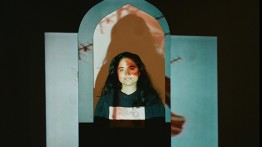The Diane Lewis Student Lecture Series | Utsa Hazarika: Liminal Architectures and Diasporic Movements
Thursday, January 30, 2025, 6:30 - 8:30pm

Image Credit: Natalia Almonte
This event will be conducted in-person in room 315F and through Zoom.
For in-person attendance, please register in advance here.
For Zoom attendance, please register in advance here.
Utsa Hazarika is an artist and writer based in New York. Her research-based practice ranges across video, sound, installation, sculpture and text, and explores how an interdisciplinary dialogue between art and social research can push us to think about power, memory and resistance. Her work has exhibited internationally, including at Socrates Sculpture Park, Smack Mellon, Hessel Museum of Art, and Museum of the City of New York in the United States. She attended the Whitney Independent Study Program, and has been awarded residencies and fellowships in Asia and the United States, including Pioneer Works (US), Queens Museum (US), and Lijiang Studio (China), and Khoj International Artists’ Association (India). She holds an MFA in Fine Arts from The New School, where she was awarded the President’s Scholarship; and an MPhil in Social Anthropology from the University of Cambridge, where she was awarded Christ College’s Levy-Plumb Award for the Humanities. Her research has been published in Ethnos: Journal of Anthropology (UK), Trans Asia Photography Review (US) and The Caravan (India).
The lecture will be followed by a Q&A moderated by Asialy Bracey Gardella.
The Diane Lewis Student Lecture Series is endowed by Elise Jaffe + Jeffrey Brown.
This event is free and open to the public. Registration is required.
Located at 7 East 7th Street, between Third and Fourth Avenues




